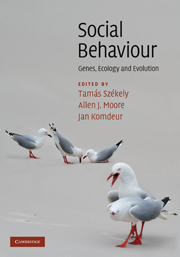Book contents
- Frontmatter
- Contents
- List of contributors
- Introduction: The uphill climb of sociobiology: towards a new synthesis
- Profile: Undiminished passion
- Part I Foundations
- Part II Themes
- 7 Aggression: towards an integration of gene, brain and behaviour
- Profile: From behavioural observations, to genes, to evolution
- 8 Social influences on communication signals: from honesty to exploitation
- Profile: Reputation can make the world go round – or why we are sometimes social
- 9 Important topics in group living
- Profile: A haphazard career
- 10 Sexual behaviour: conflict, cooperation and coevolution
- Profile: In celebration of questions, past, present and future
- 11 Pair bonds and parental behaviour
- Profile: Mating systems and genetic variation
- 12 Adaptations and constraints in the evolution of delayed dispersal: implications for cooperation
- Profile: Selections from a life in social selection
- 13 Social behaviour in microorganisms
- Profile: The de novo evolution of cooperation: an unlikely event
- 14 Social environments, social tactics and their fitness consequences in complex mammalian societies
- Profile: Evolutionary genetics and social behaviour: changed perspectives on sexual coevolution
- 15 Social behaviour in humans
- Profile: Genes and social behaviour: from gene to genome to 1000 genomes
- Part III Implications
- Species index
- Subject index
- References
Profile: Evolutionary genetics and social behaviour: changed perspectives on sexual coevolution
Published online by Cambridge University Press: 05 June 2012
- Frontmatter
- Contents
- List of contributors
- Introduction: The uphill climb of sociobiology: towards a new synthesis
- Profile: Undiminished passion
- Part I Foundations
- Part II Themes
- 7 Aggression: towards an integration of gene, brain and behaviour
- Profile: From behavioural observations, to genes, to evolution
- 8 Social influences on communication signals: from honesty to exploitation
- Profile: Reputation can make the world go round – or why we are sometimes social
- 9 Important topics in group living
- Profile: A haphazard career
- 10 Sexual behaviour: conflict, cooperation and coevolution
- Profile: In celebration of questions, past, present and future
- 11 Pair bonds and parental behaviour
- Profile: Mating systems and genetic variation
- 12 Adaptations and constraints in the evolution of delayed dispersal: implications for cooperation
- Profile: Selections from a life in social selection
- 13 Social behaviour in microorganisms
- Profile: The de novo evolution of cooperation: an unlikely event
- 14 Social environments, social tactics and their fitness consequences in complex mammalian societies
- Profile: Evolutionary genetics and social behaviour: changed perspectives on sexual coevolution
- 15 Social behaviour in humans
- Profile: Genes and social behaviour: from gene to genome to 1000 genomes
- Part III Implications
- Species index
- Subject index
- References
Summary
Studies of the evolutionary genetics of sexual behaviour have undergone major changes in the last few decades (see Chapters 2 and 10). There have been many great successes in identifying and analysing the influence of single genes, but also an increasing realisation that sexual coevolution and social interactions can influence the evolution of sexual communication systems in unpredictable ways.
When I was a zoology student at the University of Edinburgh in the early 1980s, studying the evolutionary genetics of behaviour seemed an interesting and reasonably tractable project. Lectures in genetics, particularly by Trudy Mackay and Doug Falconer, had impressed upon us that traits like morphology or milk yield in cows were influenced by too many genes to ever identify, so a statistical approach to partitioning genetic and environmental effects (heritability) was necessary. Lectures on the evolution of behaviour, particularly from Linda Partridge and Aubrey Manning, had shown how the genetic control of behaviour had itself evolved, and that the amount of genetic variation for traits was a key to understanding behavioural evolution. So, for example, females exert sexual selection on males by choosing mates based upon traits which evolve in a manner equivalent to milk yield in cows. These traits are correlated with fitness (for indirect genetic benefits, or ‘good genes’). However, mutual coevolution between male and female traits was particularly important.
- Type
- Chapter
- Information
- Social BehaviourGenes, Ecology and Evolution, pp. 391 - 394Publisher: Cambridge University PressPrint publication year: 2010



